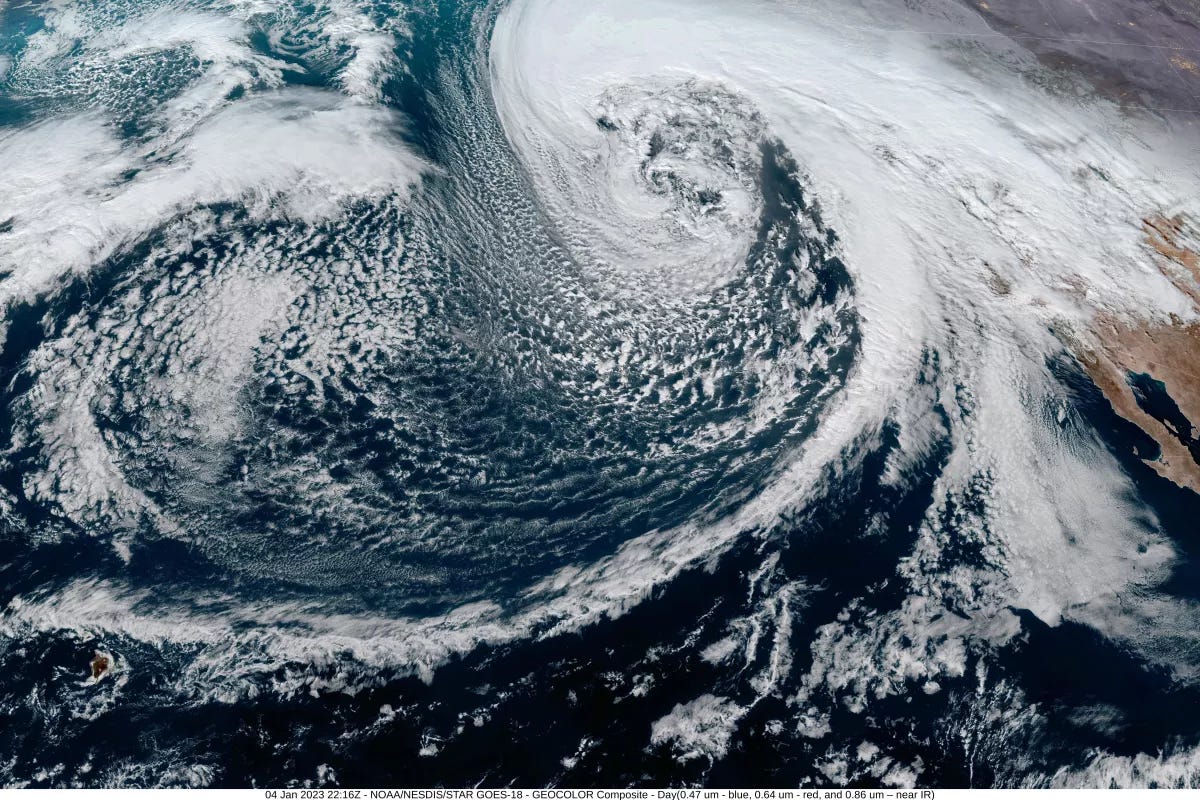Saturation
When it rains...
For this edition of the Steady newsletter, my longtime collaborator on this venture and others, Elliot Kirschner, offers a dispatch from California.
— Dan
Saturation.
It’s a word that these days is saturating my home state of California. Most of the focus is on the Earth’s physical saturation — wave after wave of punishing storms has produced more water than the ground can hold.
Rivers rise. Valleys fill. Mud slides.
But saturation strikes the psyche as well as the soil. For years, the Golden State has been plagued by historic drought. Now, prayers for rain, unheeded in previous “rainy” seasons, have suddenly given way to abundance. We’re drenched.
The wind howls. The sheets of rain stream sideways. Streets flood.
We require water to sustain us. And yet increasingly we teeter on a climatic seesaw — swings of fortune between life-giving and life-taking, creation and destruction, hope and despair.
It is something to look up the weather forecast and see nothing but bubbly little rain cloud icons marching across the week ahead. But the reality is far graver than these cute images suggest. Band after band of storms has sped across the Pacific, scooping up moisture and energy. They constitute what's called a “Pineapple Express,” which sounds more like a poolside beverage than the waves of color-coded destruction dominating the satellite imagery. These weather systems are so massive in scale that they compete with the contours of a continent.
Down on the ground, they are felt before they arrive in full force. The winds start to swirl. And the tenor of the skies intensifies in grayness. Then the water comes, first overflowing the coastal headlands, then spilling inland, and finally depositing peaks of snow in the mountains. The sheer volume of precipitation feels unfathomable. News reports refer to “trillions of gallons,” as if we can wrap our minds around what that means.
What is much more immediate is the sickening sense of a world out of balance, alternating between extremes with no space for pausing, reflecting, or reimagining. I grew up in California, and I remember wet winters and foggy summers. There was a pace to seasons that, while not as dramatic as in other parts of the country, still made sense.
But that world of my childhood is gone, thanks in large part to the climate crisis. While there have always been swings in the weather, the data of a new reality is overwhelmingly persuasive to anyone who is willing to pay attention to the science. We didn’t know how precarious our equilibrium with nature was until we took it for granted. Our hubris can be measured in too much rainfall, and too little.
And yet there is another narrative emerging, one of resilience. For all of California’s problems, it has long been a place that has incubated dreamers who could imagine new realities and then will them into existence.
So it has yielded some comfort to see hopeful news stories competing with dire reports about immediate threats to human life and material destruction. We learn about bold ideas for capturing more storm runoff to protect against drought. We read about how conserving wilderness could blunt flooding. And we hear from leaders beginning to reimagine our statewide relationship with water.
Right now, thoughts are with those in the greatest peril, recognizing that it is the marginalized who suffer the most. Next, we will have to assess what this means for the drought and the prospects for the near future. But now is also the time to grapple with the larger trend lines.
This new reality demands we reckon with reality. Rain. Or shine.
Note: If you are not already a member of the Steady community, please consider subscribing. We always appreciate you sharing our content with others and leaving your thoughts in the comments.


Saturated is a good word for our time: drowning in rain, but also in guns, lies, bad news, crazy conspiracy theories, mental illness, drug abuse, and want-a-be fascists... while public discourse is a dessert of humility and kindness not unlike the Mojave. If we can name it, we can change it. What do we need to understand to evolve a better home ) country ) world ) ???
Friends in San Francisco said not to worry because they live up high -cousins in Irvine seem to be OK. I’m trying to imagine what’s happening to the coast highway -how many people will be displaced hurt killed -it’s astounding, and yet we have people in Congress who glory in their denial of science.